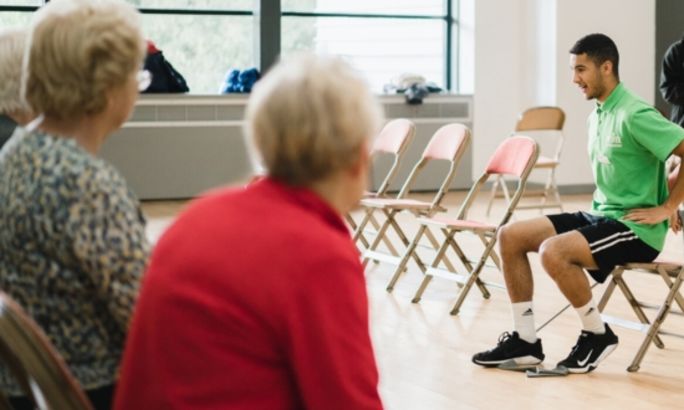BETTER BALANCE
Better Balance is a person centered, group based programme, offering adaptive movement patterns to support individuals with strength and balance exercises to improve confidence in activities of daily living. All Better Balance classes are led by Falls Prevention Specialists, following the evidence based FaME intervention*.
FaME specifically includes teaching the backward chaining model, enabling clients to learn and practice how to get up from the floor, preventing the physical health and psycho-social impact of a long lie.
Studies have shown numerous benefits to the individual. It will help to reduce the number of falls-related injuries, which would lead to a reduction in the number of hospital admissions and emergency department attendances.
The programme will help to improve the quality of life for older adults, as it would enable them to live independently for longer. Sessions include a social element to facilitate group support reducing social isolation and improving wellbeing.
*FaME is a programme developed through research studies such as Skelton 2019.
Am I suitable?
We want as many individuals as possible to receive valuable and trustworthy advice. All our services and programmes are inclusive, yet your safety is our biggest priority. That’s why we’ve created inclusion criteria for our Better Balance programme to care for you and our team. You can start the programme if you:
- Fear of falling
- Feeling unstable
- History of falls (injurious or non-injurious)
- Low bone density and/or family history of osteoporotic fractures
There are some people who might not be able to start the programme due to health reasons. If you’re unsure whether you can begin or not, get in touch with our team to help with your questions. If you have had a fall within the past 6 months, we ask you to contact your GP or a local Falls liaison service as your first contact.
What Happens?

The programme is led by highly skilled Postural Stability Instructors (PSI) who are able to offer a range of information and expert advice for service users, their carers and families. Once the referral has been received from the necessary health professional or via self-referral, you will be contacted for some further information on your health and complete some questionnaires during a telephone consultation.
If you are deemed suitable for the programme, you will be booked for a face to face Initial Assessment at one of your local Better Leisure Centres. The initial assessment will last for 45-60 minutes and will understand your specific strength and balance needs and fitness level. Throughout the programme, you will further receive advice and have regular reviews/assessments, alongside signposting to other exercise opportunities. Exercises are structured and progressed over a period of weeks and months to suit your individual needs.
The 3 ways to Better Balance
There are 3 types of Better Balance Classes, during your assessment you will be informed which level best suits your ability.
Better Balance – Preparation
This level comprises of introductory weekly one-hour group exercise sessions with an optional 30-minute social refreshment opportunity afterwards. For the best outcomes, it is recommended to additionally do home exercises 2 x week – a homework booklet and access to video demonstrations will be provided to you to support this.
Better Balance – Action
This level is a continuation of the preparation stage and will build on the skills already developed. In this level an element of floor work is introduced and here we will help you with confidence with getting up and down to the floor. Similarly to preparation, homework books are recommended to be completed 2x a week.
Better Balance – Maintain
This again is a continuation of Better Balance- Action, Classes are 60-minutes and are held weekly. We may also signpost you to other Healthwise sessions such as Supervised Gyms and Aquatic Activity for Health, to help reach the recommended level of physical activity.
What are the outcomes?
Studies have shown numerous benefits to the individual. It will help to reduce the number of falls-related injuries, which would lead to a reduction in the number of hospital admissions and emergency department attendances.
The programme would help to improve the quality of life for older adults, as it would enable them to live independently for longer. Sessions include a social element to facilitate group support reducing social isolation and improving wellbeing.
To find out more click here.